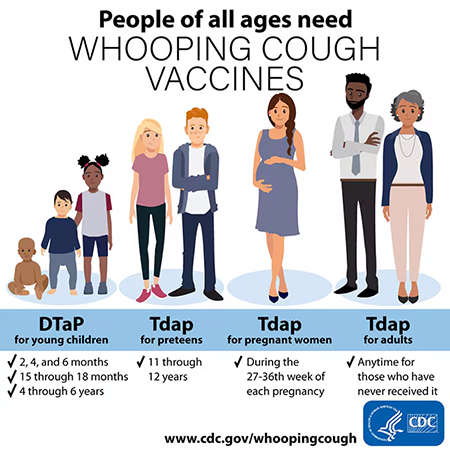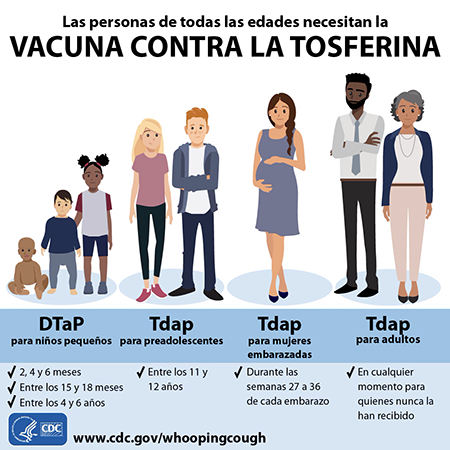Pertussis (whooping cough)


Additional information
CDC National Immunization Information Hotline (week days from 8 a.m.-11 p.m.)
English: 1-800-232-2522
Spanish: 1-800-232-0233
Resources (videos)
What is that Sound? Whooping Cough (¿Qué es ese sonido? Tos ferina)
Así suena la tos ferina
(In Spanish) (This is What Whooping Cough Sounds Like)Mayo Clinic Whooping Cough
(In English with Multiple Language Subtitles Available)Why Should You Get the Pertussis Vaccine?
(In English with Multiple Language Subtitles Available)Pablo Sandoval Tos Ferina - Pertussis PSA
(In Spanish with Multiple Language Subtitles)
What is pertussis?
Pertussis (also called whooping cough) is a disease caused by bacteria that spreads from person to person with close contact. Pertussis is often mild in older children and adults but can cause serious problems in infants.
Medical testing is recommended whenever pertussis is suspected, regardless of age.
Who is most likely to get pertussis?
In Massachusetts, pertussis is most common among people ages 10-20 who have lost the protection they received from childhood vaccines.
Infants are also likely to get the disease since they are often too young to have full protection from the vaccine.
When does a 'whooping' sound occur?
A child who has pertussis may make a "whooping" sound after coughing several times in a row as they try to take in a deep breath.
If your child makes a "whooping" noise (which sounds like "hoop") after severe bouts of rapid coughing, it is most likely a symptom of pertussis (whooping cough)—especially if your child has not received a diphtheria/tetanus/pertussis (DTaP) vaccination.
Infants with pertussis usually do not "whoop" after prolonged episodes of coughing, but they may not get enough oxygen or they may even stop breathing with this disease.
In infants and very young children, pertussis can be deadly, so call your child's doctor right away if you believe your child may have pertussis.
What are the symptoms?
Pertussis is a cough illness with symptoms that can range from mild to severe. It usually begins with cold-like symptoms, runny nose, sneezing, and dry cough. The cough lasts for a week or two, then slowly gets worse. The next stage, which may last from four to six weeks, is marked by uncontrollable coughing spells, often followed by vomiting. The person may appear to be well between spells, and usually, there is no fever.
These typical symptoms are more common in infants and young children. Vaccinated children, teens, and adults may have milder symptoms that can seem like bronchitis.
Children who have pertussis are required to take five days of antibiotic treatment before they can return to school.
How is pertussis spread?
The bacteria that cause pertussis live in the nose, mouth, and throat and are sprayed into the air when an infected person sneezes, coughs, or talks. Other people can inhale the bacteria in the droplets produced by the person with pertussis. Touching a tissue or sharing a cup used by someone who has pertussis can also spread the disease.
The first symptoms usually appear 7 to 10 days after exposure, although sometimes people do not get sick for up to 21 days after their last exposure.
How is pertussis diagnosed?
A doctor may suspect that a person has pertussis based on their symptoms. However, a laboratory test is the only way to confirm it. The type of test that should be done depends on the child's age and how long they have been coughing.
Your child’s healthcare provider should consult the Department of Public Health to determine the correct test.
How can pertussis be prevented?
Although the DTP or DTaP vaccine (diphtheria, tetanus, pertussis) usually provides adequate protection against pertussis, the effects of the vaccine wear off over time, leaving most teens and adults at risk for contracting the disease. However, a vaccine for teens and adults, called Tdap, is now recommended to protect against pertussis in these age groups. Tdap is given as a single “booster” dose. Antibiotics are sometimes given to help prevent illness in people who may have come in contact with someone who has pertussis or to decrease infectiousness in someone with pertussis. After five days of treatment, a person is no longer contagious.
If a child or adolescent (10 years or older) has not yet had a dose of Tdap, contact your healthcare provider to discuss receiving this vaccine. Children under age 7 should be up to date if they have already received the vaccine, but check with your health-care provider if you are unsure.
What should families do?
If your child has any symptoms of pertussis, please keep your child at home and contact your healthcare provider.
If you have any questions, please contact your child’s healthcare provider, your school nurse, the Holyoke Board of Health’s Public Health Nurse at (413) 322-5595, or the Massachusetts Department of Public Health at (617) 983-6800.
